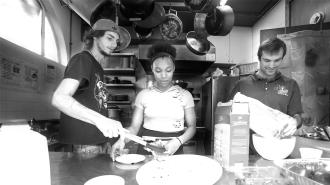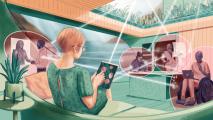Many young LGBTQ adults lack family or social support. But in Chicago, The Crib is a place they can call home.
Every night, young adults pass through the basement door of the Lakeview Lutheran Church, close to the heart of Boystown, the gay neighborhood-within-a-neighborhood on Chicago’s North Side. Like many institutions in Lakeview, the church offers a place specifically welcoming to the LGBTQ community.
These young adults are taking refuge at The Crib, an overnight emergency shelter for people aged 18 to 24 who find themselves temporarily homeless. Founded by The Night Ministry in 2011, The Crib is one of the few places in the city where young LGBTQ adults, especially those of color, can find housing and community with others their age in similar situations.
Here, they can access hot meals, showers, laundry, and — the reigning priority for everyone — a place to charge their phones. The cream-colored walls of the multipurpose room hold a bank of small lockers and charging stations, along with motivational signs depicting a green-eyed cat with good life advice: “Be Like a Cat — Cute with Boundaries.”
The Crib’s visitors arrive by 8:30 in the evening, and intake lasts until 8:45, with dinner and programming beginning at 9 p.m. Guests can stay until 9 a.m. the next day. During this time, they not only receive services and resources, they pitch in, too. Guests are responsible for doing chores such as setting up for meals and cleaning the bathrooms, for which they earn bus cards, which they often use to visit friends in the city, look for jobs, and attend school.
While Lakeview’s basement shelter can only accommodate 21 guests a night (chosen by lottery if they are overcapacity), no one is turned back on the street: buses from Catholic Charities will take those who do not get in to other shelters in the area.
Of everything The Crib offers, human connection is among the most important, says Dawnn M. Pirani Brumfield, the program supervisor at The Crib. The ability to safely socialize and speak with someone who is understanding, without judgment or fear, is a great benefit to guests. Many who rely on the shelter have been cut off from family and social support structures due to their sexuality or other circumstances, and so staff, volunteers, and guests at The Crib can help to fill that need.
“I’ve had multiple experiences where I felt alone, didn’t have anybody to talk to, and I was able to talk to most of the staff that work here,” says ‘Mya’, a guest of The Crib. She first came to The Crib this past fall, after another shelter offered her and her older sister the option of being split up or leaving.
When they refused to be parted, the shelter brought them to The Crib. Being able to express her feelings is important, she says: she’s been rejected and beaten in the past for talking about her feelings. It was understandably hard for her to talk about her experiences when she first arrived at The Crib.
Too often, the homeless and housing-insecure are blamed for their circumstances: they are lazy, crazy, or addicted. While mental health issues are often a factor, every individual’s experience is different and complicated. Mya’s world was shaken after she was raped, and rather than finding support from her family, she was shamed and looked at differently.
“One of the staff helped me to open up, and reassured me that it was ok,” Mya says. “And I don’t get that a lot.”
Brumfield believes that providing care from a trauma-focused lens is the biggest thing that differentiates The Crib from similar shelters. They consider not only the hardship of homelessness, but the other challenges faced by being a young adult of color and/or identifying on the LGBTQ spectrum. As a rule, homelessness does not stem from one problem but a cascade of them, and The Crib’s guests are no exception. They often deal with exclusion from their family, community, and support structures, as well as problems with the school or criminal justice systems or general animus toward sexual minorities.
With these issues in mind, the staff of The Crib try to make it a space that feels safe, welcoming, and understanding. Not dividing guests by sex, for example, is helpful for transgender guests, who need not be forced to choose an identity or be housed with a group they do not identify as.
When she is not at The Crib, Mya is using her bus cards to look for a job. She walks the city, enjoying the sights, or rides the L, snaking across Chicago at roof level. She listens to rap and R&B, as well as soothing sounds, like nature or a stripped-down drum track.
Not dividing guests by sex, for example, is helpful for transgender guests, who need not be forced to choose an identity or be housed with a group they do not identify as.
To help more at-risk young people like Mya and her sister, The Crib deploys a team that travels to schools, libraries, and the city’s popular hangout spots, looking for young adults in need of homeless services or community support. With stickers, posters, and a network of other nonprofits, they are building bridges for those who may need refuge, carrying on the work first begun by The Night Ministry in 1976.
The Crib and other Night Ministry programs always need donations, Brumfield says. Not only money and material goods (like socks, underwear, and toiletries) but also time. Connecting with people who are accepting and open can make a dramatic impact in the lives of young adults like Mya.
For more information on The Crib and other programs by The Night Ministry, go to thenightministry.org






